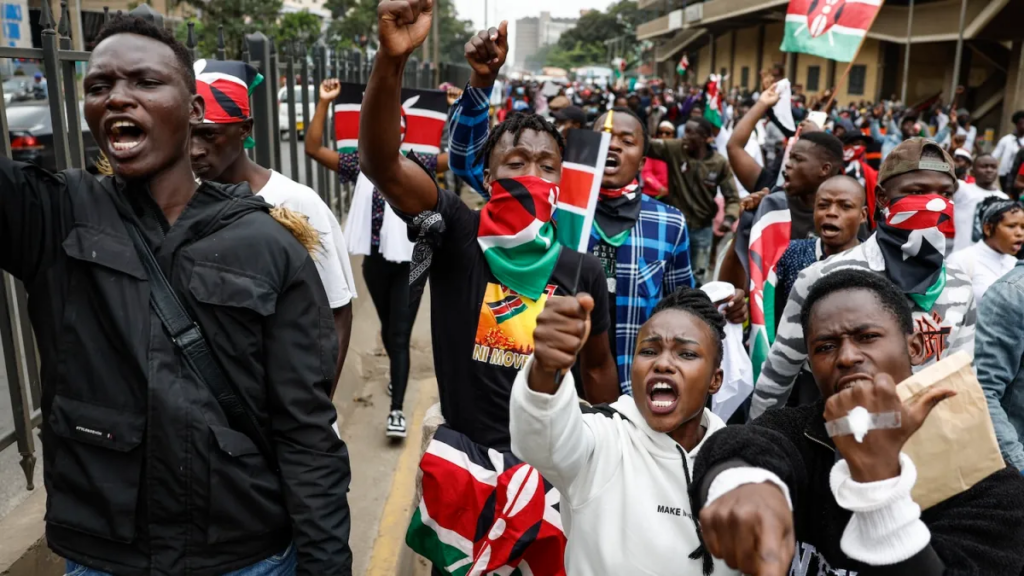This week, as President William Ruto addressed city residents, the streets of Nairobi painted a picture more powerful than any speech. The brazen theft, ruthless muggings, and lawlessness happening in broad daylight, in full view of the Head of State, were not just crimes. They were a raw message from Kenya’s disillusioned youth, a cry from a generation abandoned by the system that promised them hope.
My heart broke as I watched a Muslim man clutch his wife’s hand as they were stripped of everything. The terror in their eyes mirrored a nation on the brink. On Thika Road, shattered windows and stolen possessions told the same story. How much longer before desperation erupts? No police force can stop a youth that has lost hope.
Just as despair crept in, a different message emerged. The Africa Youth Leadership Forum (AYLF) released a report titled “Understanding the Status of Youth Participation in Key Government Areas,” funded by the Danish Government and offering a glimmer of hope. The report exposed a truth long ignored — Kenya’s youth are not violent by nature or criminals by choice—they are simply unheard.
The looting and defiance of the law were not merely acts of crime; they represented desperate protests — a message that must not be overlooked. This report reveals Kenya’s opportunity to transform that cry of desperation into meaningful change.
First, youth participation in governance remains dismal. Despite forming the majority, 73% do not engage in county governance or budgeting, and 85% feel unrepresented. The few youth MCAs that exist rarely engage with their constituents. This exclusion leaves young people powerless over policies that shape their future.
Second, political apathy and disengagement are growing concerns. Sixty-five percent do not belong to any political party, citing corruption and a lack of trust in the system. Fifty-seven percent have never received voter registration education, and while 88 percent plan to vote, many feel their vote will not change anything. This disillusionment threatens democracy.
Third, corruption and fear of reporting are deeply embedded. While 87% deny engaging in corruption, 14% admit to it, citing survival and normalized bribery. 56% know corrupt individuals but fear reporting them due to lack of trust in authorities and threats of retaliation. If young people see corruption as survival, isn’t Kenya’s moral fabric unraveling?
Fourth, limited civic education and awareness of the Constitution disconnect youth from governance. While 34% read the Constitution only when necessary, 28% have never read it. Furthermore, 73% believe the Office of the Registrar of Political Parties does not educate citizens about political parties, which hinders informed participation. Without legal awareness, youth remain susceptible to manipulation.
Fifth, barriers to youth representation continue to hinder progress. Policies designed to uplift youth largely remain unknown. Over 60% lack knowledge of any youth policies enacted by their counties. Worse yet, county governments have failed to prioritize youth employment, education, and leadership. If young people are not included in the solution, they will become part of the problem.
This moment in Kenya’s history is more than an outcry from the oppressed. It is a test of whether the nation will listen. If we fail to act, the chaos on the streets will escalate as previously seen. If leaders ignore young people, today’s muggings will develop into a full-blown crisis.
But there is hope. AYLF has demonstrated that youth want to be engaged, empowered, and heard. Kenya must act now. Youth representation in governance and budgeting must become the standard. Civic education and voter participation must be strengthened so that every young Kenyan understands their rights. Transparency and accountability must enable citizens to report corruption without fear. Leaders must involve youth in genuine discussions; naturally, the youth must register as voters!
The violence in our streets is not the problem. It is a symptom. Let’s empower our youth or watch them fight against a broken system.’Tuajibike.’ Think green, act green!




4 Comments. Leave new
It’s the pathetic state of our nation
The youth have lost hope simply defined as “tomorrow will be better than today”.
This is good finding. Kenyan youth need to be heard and someone to believe them.
Nice article, I saw the mention of AYLF and it got me thinking of the impact it has made on my outlook on life so far. That said, your tone is really intuitive and capturing, hope the message spreads far and wide.